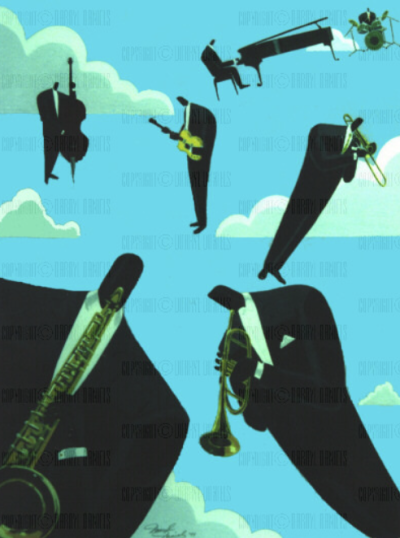.
.
“Blue Note” was a short-listed entry in our recently concluded 65th Short Fiction Contest, and is published with the consent of the author.
.
.
___
.
.
painting by Darryl Daniels

.
Blue Note
by Isabella Brown
.
…..There’s been jazz music playing under my apartment for two weeks now. It doesn’t stop, not even at night. I wish I could blame it on neighbors, but I live in a ground-floor apartment, so nobody lives under me. I’ve tried to brush it off as some newly-opened jazz club or maybe a jazz band that has started busking in the street, two things which wouldn’t be uncommon here in New York City. But whatever it is, I just can’t figure out why it seems to be coming from underneath my apartment.
…..With every day that went by, it seemed to grow louder, and I almost couldn’t function because of it, which sounds ridiculous, like, oh my god I can’t live because it sounds like The Miles Davis Quintet lives underneath my apartment, but seriously, I reached a point at which I couldn’t take it anymore. The fact that it never fucking stops, and that I have no idea how it sounds like it’s right under my apartment, and also that I work from home as an editor for horrible magazine articles. Lately, I find myself re-writing every article in a swing-rhythm kind of way, with every other word being longer than the one that follows it, and then I am sent into a fit of rage when I realize this. My boss sent me an email a few days ago letting me know that my work “was not up to par with the quality of my usual work,” and while I found this to be quite concerning, I couldn’t stop myself from re-writing that email into a swing-rhythm cadence.
…..Two days ago, I dumped my problem onto an innocent delivery driver who’d brought me the ramen I ordered (extra egg, no green onion), partially because I had nobody else to rant to about it and partially because I wanted to be reassured that he also heard the music. I wanted to be sure I wasn’t totally insane. Well, you can imagine how I reacted when this kid with a mop of ginger hair and a blank expression looked me dead in the eyes and told me in a monotone voice that he had no idea what I was talking about, that he didn’t hear anything. I must be insane, I thought, taking my ramen and shutting the door quickly. When I opened the container and found a heap of green onions floating around the broth, I threw it into the trash and screamed into my couch (Oh god, I hate that thing – it smells and it’s full of holes with cotton spilling all over the place).
…..Yesterday, the music stopped. I felt like I was in a daze; it didn’t feel real, almost too good to be true. I wrote a normal article with normal words and I texted my landlord about all of the issues in my apartment I had been trying to ignore for weeks. I even ordered pizza and chatted with the delivery boy, which was the most social interaction I had had in a long time. These days, I don’t leave my apartment unless I have to. I have too many phobias and there are too many things in the world that I’m afraid will hurt me, make me more sick than I already am. So, I stay here, in this rotting little apartment that also makes me sick, but I can deal with it because it’s just me here. It makes me feel more in control.
…..When I wake up the next morning, the music is back.
…..Now, I am standing in the middle of my living room floor, holding a saw in my right hand and a hammer in my left. My curtains are shut, I don’t want the police to be called. I close my eyes and listen to the music, a floating trumpet melody accompanied by some quirky piano harmonies, saxophone, and a shaker drum. I am going to find you, I think.
…..And then, I do it. I start to saw at my floor, which has been decaying for a while now, saggy floor boards that smell a bit sour. This helps me to remove them, because they are softer than healthy, strong wood. I use the back end of the hammer to pry up the wood. It’s a relatively quick process, and as I pull up my floor, the music grows louder, motivating me to work faster. I don’t care that I am destroying my apartment. If my landlord gives me any shit, I will push him into the hole I have made.
…..Once I have created a hole big enough for me to fit in, I stop and look down. All I see is black – it looks like an eternal black hole, and the music is simmering in the hole, slowly rising into my apartment like steam from a pot of boiling water. And then, I jump.
….. I fall for several seconds before I land. The floor is cold and hard and the impact causes a sharp pain to shoot through my legs. I don’t know where I am, only that it is completely dark. After a moment, the room fills with light, and in front of me is the music I have been hearing for weeks.
…..The first thing I notice is that the music is actually much more pleasant when I’m inside it. It’s no longer background music, I am finally looking at the musicians I have been hearing for weeks. They’re creating something right in front of me, and it’s beautiful.
…..The next thing I notice is that none of the musicians have faces, although this doesn’t freak me out like it should. There is a bass player, tall but kind of slumped over, gently plucking the strings of his instrument, and when I stare at the blurry pale surface where his face should be, I feel a surge in my stomach. Even though he doesn’t have eyes, I can tell he is staring at me. I quickly comb my fingers through my greasy hair and look away from him.
…..The lights are moody, deep blues and shades of purple, swimming around the room. I turn around, and there is a bar; behind it, a faceless bartender, who is bald and wearing a sharp tuxedo. The air smells sweet and draws me over to the bar, where there is one red leather stool. I assume that it is for me, and sit down. I don’t know if the bartender notices me, his back is turned to me now, and he appears to be making something. When he turns around, I see that he is holding a china plate with a little dark cake on it, sprinkled with powdered sugar. He sets it down in front of me.
…..“Thank you,” I say. He nods. I take a fork and stab into it, and chocolate starts to pour out of the middle. I eat all of it in five bites. I suddenly find myself overwhelmingly thirsty from the sweetness of the cake. “Can I have a dirty martini?” I ask. Within two seconds of the words leaving my mouth, he spins around and hands me the drink, and I am delighted. I drink it all in one swig.
…..The alcohol has given me courage to ask the bartender a question. “Where am I?”
…..His face, or lack thereof, doesn’t move, but I hear him speak. “You’re in a jazz club.” His voice is low, raspy, like he hasn’t spoken in a very long time.
…..“Yeah, but, why is it under my apartment? And why doesn’t anyone have a face? And why am I the only normal person here?”
…..I fear that I have asked him too much, because he turns around and doesn’t answer me for a while, but when he turns back around, he is holding out another drink. This one is in a tall silver glass, filled with a rose-colored liquid, shimmering in the light. He sets it in front of me, and I look into metal, which is showing me warped reflections of the room around me. When I see myself in the glass, I notice that I, too, no longer have a face. I turn around on my red stool and realize that a crowd of faceless people has formed, and they are all dancing. Maybe they have always been there; I might have been too distracted to notice them.
…..So, I did the only thing I knew to do, which was to slide off my stool and start dancing, to let the jagged rhythm of the music guide me to the middle of the crowd, limbs tangling with my neighbors, lost in the moving lights and gentle swaying of the floor and getting drunk from the smell of lava cake. I don’t even think about how I could get sick from being with this many people.
…..When I look on stage, the bass player is still looking at me. I smile, and he winks. And when I look up for the hole in the ceiling that I came through, I discover it is no longer there, but I don’t mind, because I have finally found somewhere I belong.
.
.
___
.
.

Isabella Brown is a 21-year-old violinist pursuing her Bachelor of Music degree at the Colburn Conservatory of Music in Los Angeles. She has won first prize in dozens of music competitions as well as performed with some of the most esteemed symphonies in the world, including the Chicago Symphony Orchestra and the Cleveland Orchestra. When she is not practicing violin, Isabella loves reading and writing and is currently working on a collection of short fiction that she hopes to publish in the future.
.
.

The artist Darryl Daniels has admired jazz music and jazz musicians for many years, and decided to combine his love for abstract, realist and figurative expression into a series of paintings beginning in 1990, which evolved into his Jazz series, which are regularly in demand and are a part many collections around the world.
Click here to view his website
.
.
___
.
.
Click here to help support the continuing publication of Jerry Jazz Musician, and to keep it ad and commercial-free (thank you!)
.
Click here to read “Ballad,” Lúcia Leão’s winning story in the 65th Jerry Jazz Musician Short Fiction Contest
Click here to read more short fiction published on Jerry Jazz Musician
Click here to read The Sunday Poem
Click here for information about how to submit your poetry or short fiction
Click here for details about the upcoming 66th Jerry Jazz Musician Short Fiction Contest
Click here to subscribe to the Jerry Jazz Musician quarterly newsletter (it’s free)
.
.
.
___
.
.
Jerry Jazz Musician…human produced (and AI-free) since 1999
.
.
.


































This was a great read! 👍